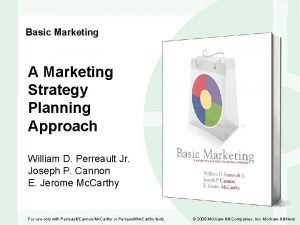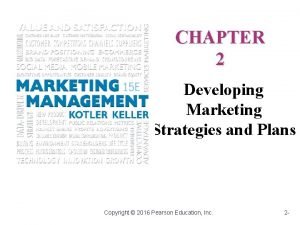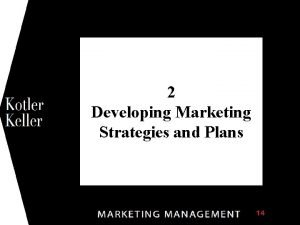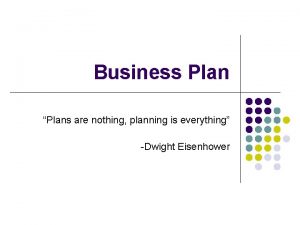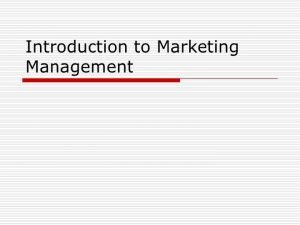Writing the Marketing Plans are nothing Planning is

























- Slides: 25

Writing the Marketing Plans are nothing. Planning is everything. Dwight D. Eisenhower Leyland Pitt 2004

Why do we need strategy in marketing? Because of Competitive Rationality Oversupply Customer Choice Imitation Innovation Customer Sophistication Leyland Pitt 2004

Components of the Marketing Plan Leyland Pitt 2004

The Marketing Planning Process 8 Executive Summary 7 Controls 1 2 Current Marketing Opportunity Situation and Issue Analysis 6 5 Projected Profit and Loss Statement Action Programs 3 Objectives 4 Marketing Strategy Leyland Pitt 2004

The Executive Summary Offers the reader Zmain thrusts of plan Zwho Zwhat Zwhen Zhow Zwhy Leyland Pitt 2004

Current Marketing Situation ¥The market ¥Customers ¥Products ¥Competitors ¥Environment ¥Distribution Leyland Pitt 2004

Opportunity and Issue Analysis ¥Do we understand competitive advantage? ¥Resources: STRENGTHS and WEAKNESSES ¥Environment: OPPORTUNITIES and THREATS Leyland Pitt 2004

A Resource Audit STRENGTH WEAKNESS Leyland Pitt 2004

Environmental Scanning SP F Politics and Legislation SE F The Economy SS F Socio-cultural: Values, attitudes and norms ST F Technology Leyland Pitt 2004

Political/Legal Leyland Pitt 2004

Economic Leyland Pitt 2004

Socio-cultural Leyland Pitt 2004

Technological Leyland Pitt 2004

Opportunity Analysis Leyland Pitt 2004

Threat Analysis Leyland Pitt 2004

Objectives and Goals Mission - What Business are We In? Is the customer always right? Objectives Goals Leyland Pitt 2004

Dilbert’s Instant Mission Statement Generator (www. dilbert. com) Our challenge is to proactively negotiate valueadded catalysts for change to exceed customer expectations It's our responsibility to collaboratively simplify innovative sources and quickly engineer highquality deliverables Leyland Pitt 2004

Marketing Strategy The Fundamental Marketing Logic by which the Organization intends to achieve its Objectives and Goals Customers Competitors Competences Collaborators What Business Are We In? Target Markets The Marketing Mix Product Price Placement Promotion Leyland Pitt 2004

Target Marketing 1. Is Creative 2. Is Changing 3. Is becoming ever-more precise 4. Mass customization Leyland Pitt 2004

The Marketing Mix Each of the components is subject to more change now than in the preceding 25 years Products? Organization? The role of brands? Blurring? Pricing? Value based. More creative. The danger of commodities Promotion? Accountability. New media. Placement? Channel power. Intermediary obsolescence. Leyland Pitt 2004

Action Programs F Should maximize likelihood that the plan will be implemented according to schedule F Identify activities, due dates, and individual responsibility Leyland Pitt 2004

Budgets *The Plan expressed in monetary units *Forms the basis for all marketing spending Leyland Pitt 2004

Teaching MBAs through the ages • • • Teaching Math in 1950: A logger sells a truckload of lumber for $100. His cost of production is 4/5 of the price. What is his profit? Teaching Math in 1960: A logger sells a truckload of lumber for $100. His cost of production is 4/5 of the price, or $80. What is his profit? Teaching Math in 1970: A logger exchanges a set "L" of lumber for a set "M" of money. The cardinality of set "M" is 100. Each element is worth one dollar. Make 100 dots representing the elements of the set "M. " The set "C", the cost of production contains 20 fewer points than set "M. " Represent the set "C" as a subset of set "M" and answer the following question: What is the cardinality of the set "P"of profits? Teaching Math in 1980: A logger sells a truckload of lumber for $100. His cost of production is $80 and his profit is $20. Your assignment: Underline the number 20. Teaching Math in 1990: By cutting down beautiful forest trees, the logger makes $20. What do you think of this way of making a living? Topic for class participation after answering the question: How did the forest birds and squirrels feel as the logger cut down the trees? There are no wrong answers. Teaching Math in 2000: A logger sells a truckload of lumber for $100. His cost of production is $120. How does Arthur Andersen determine that his profit margin is $60? Leyland Pitt 2004

Controls *set targets, evaluate reality against targets, take corrective action *annual plan control *profitability (or at least, expense) control *strategic control Leyland Pitt 2004

Implementation of Marketing Strategy Adequate Trouble Success Strategy Formulation Failure Poor Rescue or Ruin Strategy Implementation Adequate Leyland Pitt 2004
 Insidan region jh
Insidan region jh Nothing but leaves
Nothing but leaves Restful shapes moving
Restful shapes moving Alesha the boy does nothing
Alesha the boy does nothing Nothing ventured nothing gained origin
Nothing ventured nothing gained origin Nothing ___ nothing gained
Nothing ___ nothing gained Universal functions of marketing
Universal functions of marketing Sports and entertainment marketing lesson plans
Sports and entertainment marketing lesson plans Chapter 2 developing marketing strategies and plans summary
Chapter 2 developing marketing strategies and plans summary Sports and entertainment marketing lesson plans
Sports and entertainment marketing lesson plans Materi developing marketing strategies and plans
Materi developing marketing strategies and plans The marketing plan the central instrument
The marketing plan the central instrument Local marketing plans
Local marketing plans Technical writing lesson plans
Technical writing lesson plans Hát kết hợp bộ gõ cơ thể
Hát kết hợp bộ gõ cơ thể Bổ thể
Bổ thể Tỉ lệ cơ thể trẻ em
Tỉ lệ cơ thể trẻ em Voi kéo gỗ như thế nào
Voi kéo gỗ như thế nào Chụp phim tư thế worms-breton
Chụp phim tư thế worms-breton Hát lên người ơi alleluia
Hát lên người ơi alleluia Môn thể thao bắt đầu bằng từ đua
Môn thể thao bắt đầu bằng từ đua Thế nào là hệ số cao nhất
Thế nào là hệ số cao nhất Các châu lục và đại dương trên thế giới
Các châu lục và đại dương trên thế giới Công của trọng lực
Công của trọng lực Trời xanh đây là của chúng ta thể thơ
Trời xanh đây là của chúng ta thể thơ






